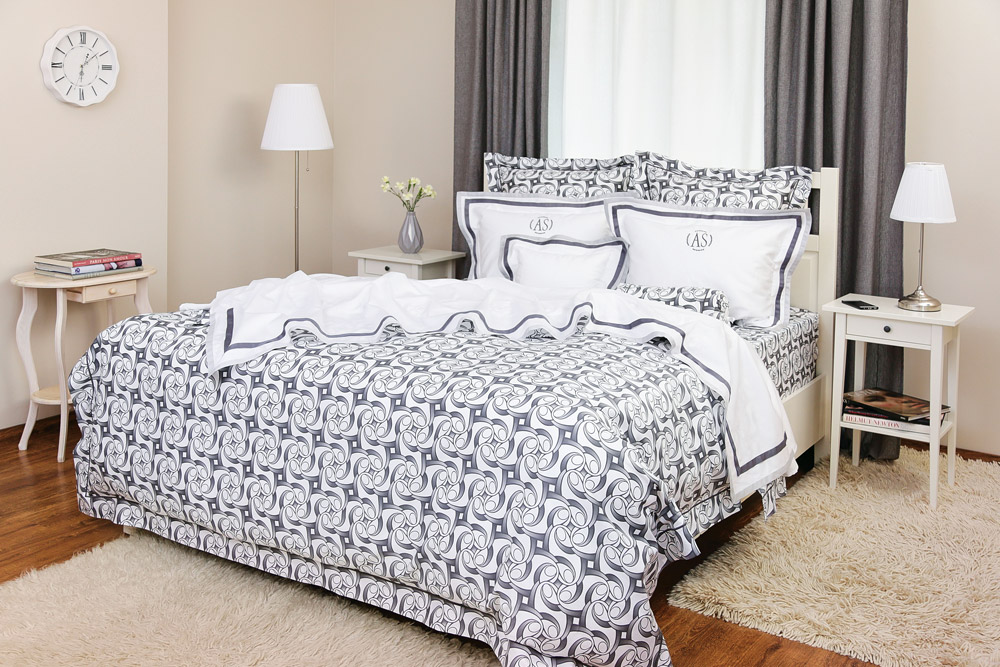In the US alone, millions of exhausted people are struggling with getting a solid set of ZZZ’s every night. Some have been dealing with this serious issue for a long time while others may just be discovering that falling and staying asleep is not as easy as it used to be. And even if you do sleep fairly well, there are always much-needed improvements that can help you achieve a more beneficial rest. Studies have shown that one of the most important contributing factors to a good sleep is our environment. So we’re sharing some easy-to-implement tips that will help you achieve a more deeply satisfying sleep—one that will bring incredibly restorative benefits to your overall well being.
1. Decor and Color
Typically colors that are softer and more subdued are more conducive to sleep. Gentle hues of blues, grays, whites and even paler greens are just some of the shades specialists often suggest. In terms of bedding patterns and designs, simple stripes, dots and other basic patterns are likely to create a more naturally soothing environment. However, in the 50+ years we’ve been helping people enjoy a better night’s sleep, we’ve found everyone is different and what works for the masses, doesn’t always apply to you. Sometimes the best way to prepare yourself for a great sleep is to create a bedroom that is in perfect harmony with your personal tastes, whatever those may be. It’s why we carry hundreds of exclusive bedding designs, so you can create the sanctuary that gives you the best chance at a positively powerful sleep.
2. Clean Sheets
When it comes to your bed, what you don’t see can hurt you. One of the biggest detractors from a healthy sleep are invisible invaders like dust mites, pet dander and other harmful deterrents. This is why it’s essential to change your sheets at least once a week. Keeping your bedding clean will provide a more comfortable experience so you can more easily fall and stay asleep. Plus, nothing beats that fresh feeling of slipping into a set of crisp sheets. If you suffer from allergies, the simple act of switching out your sheets during high allergy seasons can also be a huge help in warding off pollen and other allergens. And don’t forget the pillowcase!
3. Find the right pillow. (Pic: Comforter&Pillows-Model_0110.jpg)
While changing the pillowcase with your sheets every week is a good start, it’s also recommended to replace your pillow every few years. The dust and allergens that get trapped in pillows over time can be tough to wash out. When left in they can leave your pillow dirty—and you exhausted. When looking for a new pillow, you’ll want to find one that suits your sleeping style best. Science has shown that the right pillow can greatly benefit us in the quality of our sleep. That means the wrong one can have an adverse effect. Soft or firm? Are you a side, stomach or back sleeper? Do you have allergies? These are all important factors to consider when choosing yours. Luckily we’ve had a lot of experience helping people find their best pillow and a great selection to make it super easy and affordable.
4. Create a routine
Humans are creatures of habit and the routines we set can dictate so many aspects of our lives—this includes our sleeping routines. Maybe for you it’s a cup of chamomile tea, some time with a good book, or family time with your kids. Whatever your bedtime ritual is, by repeating the same routine night after night, you’re sending a message to the brain that says it’s time to wind down. Another added benefit of a nightly sleep routine is that it tends to keep you on a schedule to ensure you give yourself ample opportunity to get the recommended full 8 hours of sleep.
5. Make Your Bed
It’s a simple thing, but sometimes it’s the simple things that have the greatest impact. By making your bed each morning, you’re setting up your sleeping environment to be as welcoming and attractive as possible. Mentally the sight of a made bed invites us to pull the covers down and dive right in. That instinctive feeling will help prepare the brain for what’s coming—a beautiful night of sweet rest. Plus, making the bed makes a room look better so you’ll feel better about it. That feeling of pride in your room helps put you in a better state of mind when starting a new day or saying goodnight to it.
6. Simplify
Distractions are one of the biggest threats to a well rested night—and they come in so many forms. Our phones beg us to scroll a little more, the TV promises just one more episode, and no matter how beautiful the morning light may be, it can also be a bit jarring. To put yourself in the best position to experience a deeper, more fulfilling sleep it helps to identify the things that distract us. Phones should be put away well before bedtime. You may even want to put it somewhere across the room where you can still get it in case of emergency, but won’t be tempted to pick up at 1am If you watch TV before bed, set a timer to ensure your sleep is not disturbed by flashing lights and sound. And if morning light is just a bit too bright, find some drapes or blinds to ease the transition from night to day. The more simple the sleeping environment, the less distractions to keep you from the sleep you need and deserve.
7. Just Breathe
Environmental factors like phones and lighting are well within your control, but the mental ones are not so easy. When your mind is racing and you’re thinking about what happened the day before or what’s happening tomorrow, the chances of tossing and turning all night are high. Establishing a routine and creating a soothing, calming sleeping environment with the most comfortable bedding is one of the best ways to combat this, but they’re many other things you can try. Sleep meditation and breathing exercises (before bed or when you’re having trouble sleeping) have proven to be very effective in helping to quiet the mind. You can count the breaths as well. Start with 10 and count down with each breath—then repeat. These are just a few of the methods to try. Just remember that when it comes to the mind, we’re our own worst enemy. Be gentle on yourself and allow yourself to find the rest you need. Also, remember that to cultivate the mind for better sleep, sometimes you need to cultivate your environment first. By creating the optimal room for achieving a deeply restorative rest, you’re already halfway there.






